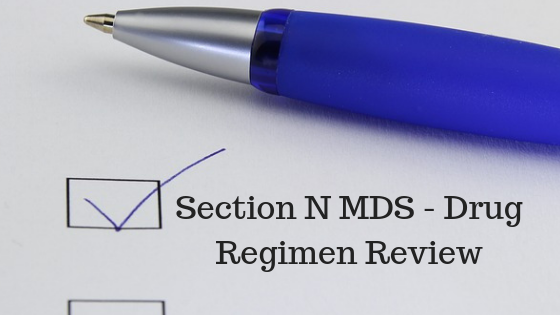As of October 1st, 2018, there has been a big update in long term care. Section N of the Minimum Data Set (MDS) has been updated to include a drug regimen review for residents upon admission. CMS will begin tracking this new quality measure. (Be sure to check out LTC PharmD if you are looking for more specific information on long term care and medication use.)
Does Drug Regimen Review under Section N of the MDS have to be done by a Pharmacist?
There is one big question that has everyone panicking. Does a pharmacist have to do the drug regimen review? If you review the following video at about 16:35, you will hear the answer is no, but there is an opening for interpretation. She goes on to discuss policy and procedures for each facility as well as applicable standards in relation to who should do the Drug Regimen Review. This update to section N of the MDS is NOT simply medication reconciliation. Keep in mind that the terminology Drug Regimen Review has historically been associated with what the consultant pharmacist does in long term care.
I’m obviously biased, but a nurse should not be expected to do a clinical review of a patients entire medication list and medical record and identify clinically significant medication adverse consequences, drug interactions, etc. The drug regimen review of Section N should be done by a pharmacist and many facilities are taking that step because the complexity of patients is overwhelming and nurses should not be required to take on that much liability in essentially acting as a pharmacist does. Should a nurse be expected to identify clinically significant issues on a resident with 20 medications?
Section N MDS, Drug Regimen Review – Case Study
The easiest way to demonstrate my point is to give an example. A 78 year old male is transferred to a long term care facility from the hospital after a recent episode of pneumonia and mild exacerbation of CHF. He also has a history of mild dementia, insomnia, hypertension, hypokalemia, diabetes, CKD, BPH, intermittent claudication, and hypomagnesemia. His current medication list includes;
- Aspirin 81 mg daily
- Atorvastatin 40 mg daily
- Diphenhydramine 50 mg at bedtime
- Donepezil 10 mg at bedtime
- Furosemide 40 mg daily
- Metformin 500 mg twice daily
- Pioglitazone 45 mg daily
- Tamsulosin 0.4 mg daily
- Hytrin 2 mg daily
- Proscar 5 mg daily
- Levofloxacin 500 mg daily for 7 days
- Magnesium oxide 400 mg twice daily
- Lisinopril 10 mg daily
- Potassium 10 meq daily
- Cilostazol 100 mg twice daily
Some concerns with this medication list that are potentially clinically significant.
- This patient is on two alpha-blockers (Hytrin and Flomax), would a nurse comfortably catch this and notify the provider? You could make the argument that the dispensing pharmacist should be helpful in identifying medication problems like duplicate therapy. However, the dispensing pharmacist will likely not have access to the medical record or the medication administration record (or at least it would not be routinely sent to them).
- Magnesium can inhibit absorption of the levofloxacin and using these together would not be appropriate. Would the nurse identify this and recommend appropriate dosing times?
- Pioglitazone and cilostazol should be avoided in heart failure. A dispensing pharmacist likely would not have a diagnosis list would have a low likelihood of catching this clinically significant concern if they did not know the resident had heart failure.
- Would the nurse recognize that diphenhydramine can exacerbate the patients BPH symptoms as well as potentially inhibit the effectiveness of the acetylcholinesterace inhibitor (donepezil)?
These are just a few examples of potentially clinically significant medication concerns without even addressing labs, vital signs, and possible clinical documentation questions. A consultant pharmacist has the ideal skillset for doing the drug regimen review and I believe it would be best practice to have a consultant pharmacist perform this task as has historically been done with the routine monthly drug regimen review.
I would make the argument that this review would be of higher importance than a routine monthly review due to the frequency of transitions in care errors. Patients are really vulnerable at this time. I realize in the short term this may lead to a higher cost burden for the long term care facility, but it is the right thing to do. In the best interests of patient safety, reducing costly hospitalizations, and healthcare costs as a whole, pharmacists have consistently demonstrated value above and beyond the cost of services. Pharmacists work with drugs everyday and can efficiently and safely identify medication related problems. While not officially required, I do believe best practice would be to have a pharmacist complete the initial drug regimen review.
Looking for more information on pharmacist long term care consulting? I’ve created a 10 hour crash course (Insider’s Guide to LTC Consulting) that will teach you how to do consulting. Another must have for a consultant/clinical pharmacist is our popular Medication Recommendation Webinar.



0 Comments